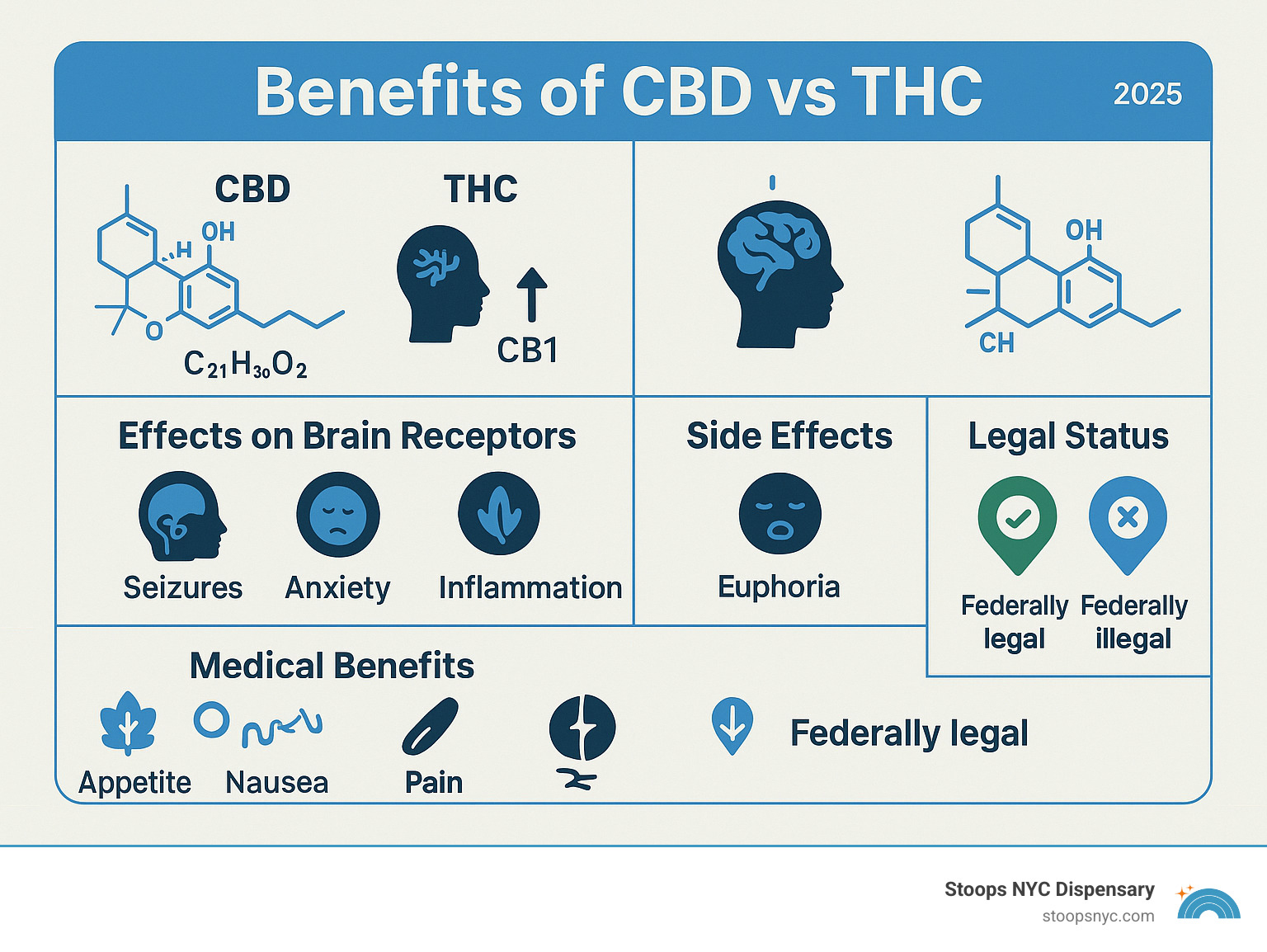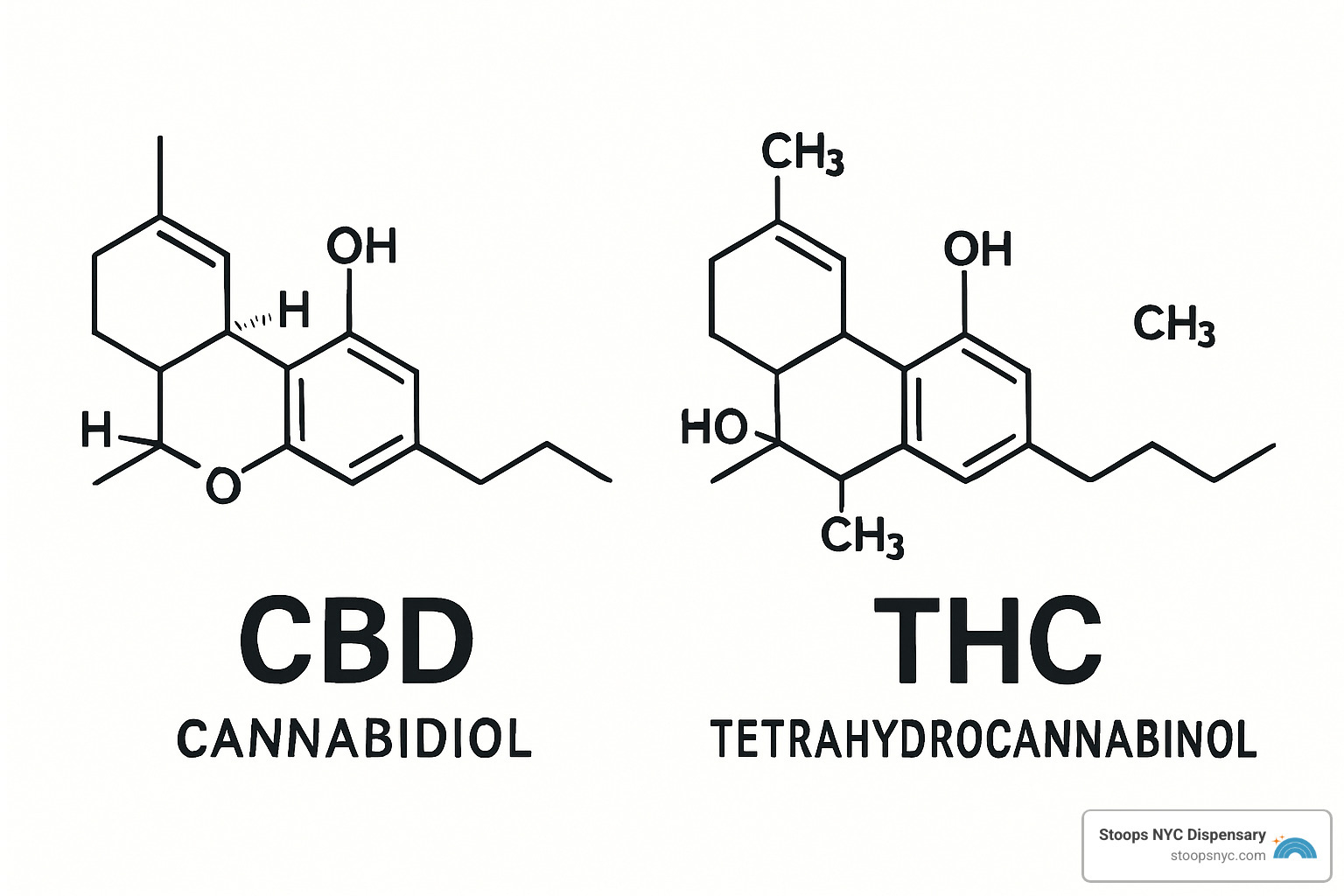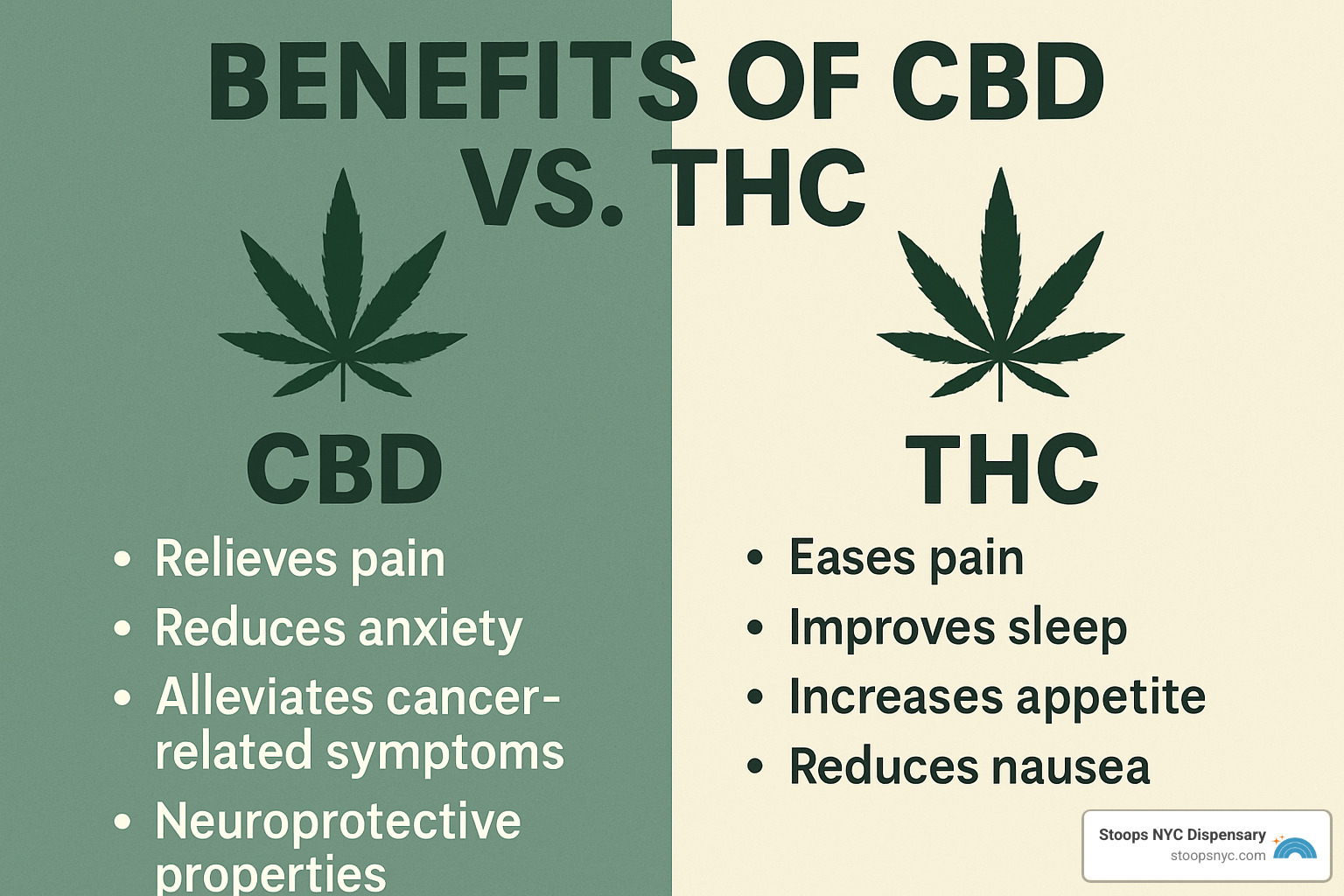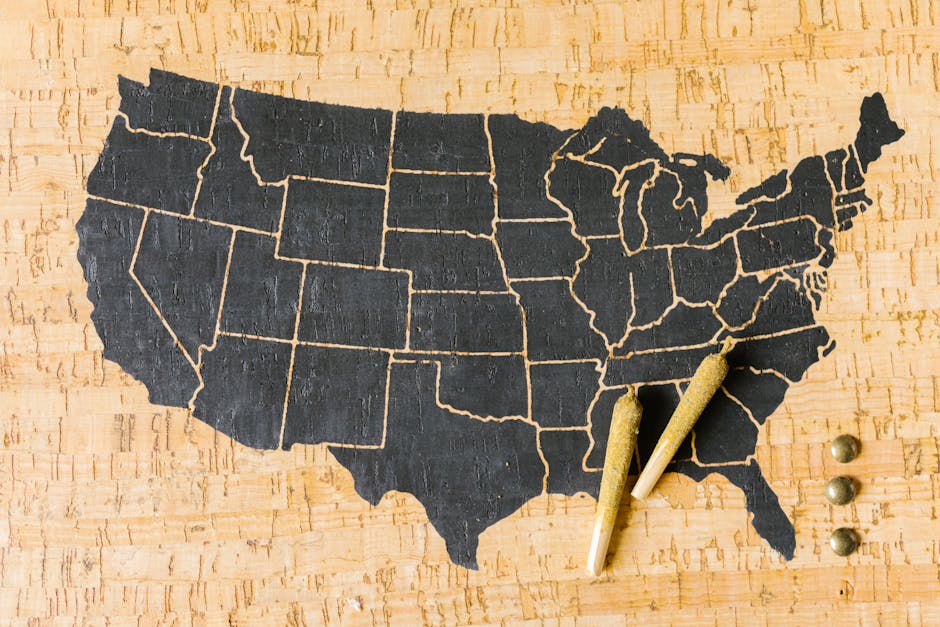Here are the benefits of CBD vs THC:
CBD Benefits:
- Reduces seizures and epilepsy symptoms
- Relieves anxiety without intoxication
- Fights inflammation and pain
- No psychoactive “high”
- Legal in all 50 states (under 0.3% THC)
THC Benefits:
- Stimulates appetite during illness
- Reduces nausea from chemotherapy
- Provides stronger pain relief
- Helps with sleep disorders
- Produces euphoric effects
Key Difference: THC gets you high, CBD doesn’t. About 30% of marijuana users develop addiction to THC, while CBD shows no addictive properties.
Cannabis contains over 100 cannabinoids, but CBD and THC are the most studied and widely available.
CBD & THC: What They Are and How They Work

Cannabis contains over 400 chemical compounds, but CBD and THC are the stars of the show. Both share the exact same molecular formula—C21H30O2—with 21 carbon atoms, 30 hydrogen atoms, and 2 oxygen atoms.
These molecules interact with your endocannabinoid system (ECS). This system includes CB1 receptors (mainly in your brain and nervous system) and CB2 receptors (primarily in your immune system and digestive tract).
THC acts like a key that fits perfectly into CB1 and CB2 receptors, directly binding and activating them. This direct connection triggers the release of dopamine in your brain’s reward center, creating that euphoric “high” feeling.
CBD works more like a sophisticated moderator, indirectly influencing these receptors without binding directly. Instead of producing intoxication, CBD supports your endocannabinoid system to promote balance and reduce inflammation.
Your body naturally produces endocannabinoids like anandamide (the “bliss molecule”) and 2-AG. These compounds help regulate mood, pain, appetite, and sleep. When you consume CBD or THC, you’re essentially supplementing this natural system.
Endocannabinoid Pathways and the Benefits of CBD vs THC

The endocannabinoid system operates through retrograde signaling—a fancy term for “backward communication.” Unlike most neurotransmitters that flow from sender to receiver, endocannabinoids travel backward, telling the sending neuron to slow down or stop.
This unique mechanism explains why cannabis can be both energizing and relaxing, depending on what your body needs. When you’re stressed, your ECS works to restore calm. When you’re in pain, it helps dial down the intensity.
CBD improves this natural process by preventing the breakdown of your body’s own endocannabinoids. It’s like having a good friend who helps you be the best version of yourself—supportive but not overwhelming.
THC, on the other hand, jumps into the driver’s seat, directly activating receptors and creating more dramatic effects. This can be beneficial for severe symptoms but may overwhelm some people’s systems.
Benefits of CBD vs THC

Here’s a breakdown of how these compounds stack up:
| Aspect | CBD | THC |
|---|---|---|
| Psychoactive Effects | None (won’t get you high) | Yes (euphoric high) |
| Pain Relief | Moderate, anti-inflammatory | Strong, direct pain blocking |
| Anxiety | Reduces anxiety | Can increase or decrease anxiety |
| Appetite | May suppress appetite | Stimulates appetite (“munchies”) |
| Sleep | Promotes relaxation | Sedating at higher doses |
| Nausea | Mild anti-nausea effects | Strong anti-nausea effects |
| Seizures | FDA-approved for epilepsy | Limited evidence |
| Addiction Risk | None | 30% of users develop dependence |
| Drug Testing | May cause positive results | Definitely causes positive results |
| Legal Status | Legal federally (<0.3% THC) | Illegal federally, legal in many states |
Key Medical Benefits of CBD

The FDA has approved Epidiolex, a 99% pure CBD medication, for treating seizures in two severe forms of epilepsy: Dravet syndrome and Lennox-Gastaut syndrome. This approval came after rigorous clinical trials showing significant seizure reduction in children and adults.
Anti-seizure properties represent CBD’s most well-documented benefit. Patients with treatment-resistant epilepsy often experience 50% or greater reduction in seizure frequency when using CBD.
Anxiolytic effects make CBD popular among our customers dealing with everyday stress. Unlike prescription anti-anxiety medications, CBD doesn’t cause sedation or cognitive impairment. It works by activating serotonin receptors (5-HT1A) in addition to its endocannabinoid effects.
Anti-inflammatory action helps with conditions like arthritis, inflammatory bowel disease, and general chronic pain. CBD inhibits inflammatory cytokines while promoting the body’s natural healing processes.
Antipsychotic properties show promise for conditions like schizophrenia and bipolar disorder. Research suggests CBD can reduce symptoms without the severe side effects of traditional antipsychotic medications.
Neuroprotective benefits may help with neurodegenerative diseases like Alzheimer’s and Parkinson’s. While research is ongoing, early studies show CBD can protect brain cells from damage and reduce neuroinflammation.
Key Medical Benefits of THC
The FDA has approved several THC-based medications, including dronabinol (Marinol, Syndros) and nabilone (Cesamet). These synthetic versions of THC treat specific medical conditions where the psychoactive effects are considered acceptable trade-offs.
Chemotherapy-induced nausea and vomiting respond exceptionally well to THC. Cancer patients often find THC more effective than traditional anti-nausea medications, especially when combined with CBD.
Appetite stimulation helps patients with AIDS, cancer, and eating disorders. THC activates CB1 receptors in the hypothalamus, triggering hunger signals even when illness suppresses natural appetite.
Chronic pain relief often requires THC’s direct receptor activation. Conditions like neuropathic pain, fibromyalgia, and multiple sclerosis-related pain respond better to THC than CBD alone.
Glaucoma treatment benefits from THC’s ability to reduce intraocular pressure. While not a cure, THC can provide temporary relief from this sight-threatening condition.
Sleep disorders improve with THC’s sedating effects at higher doses. Many patients with insomnia find THC helps them fall asleep faster and stay asleep longer.
Risks, Side Effects & Safety Profiles
Understanding the benefits of CBD vs THC requires honest discussion about potential risks. Neither compound is completely without side effects, though their safety profiles differ significantly.
CBD side effects are generally mild and include:
- Fatigue or drowsiness
- Dry mouth
- Diarrhea or stomach upset
- Changes in appetite
- Irritability
Drug interactions pose the biggest concern with CBD. It can affect how your liver processes other medications, potentially increasing or decreasing their effectiveness. Always consult your healthcare provider before combining CBD with prescription drugs.
THC side effects can be more pronounced:
- Short-term memory impairment
- Anxiety or paranoia (especially at high doses)
- Increased heart rate
- Dry mouth and red eyes
- Impaired coordination and judgment
Dependency risk affects about 30% of regular THC users. While not as severe as alcohol or opioid addiction, cannabis use disorder is real and can impact daily functioning.
Adolescent brain development faces particular risks from THC exposure. The brain continues developing until age 25, and regular THC use during this period can affect cognitive function and increase addiction risk.
Cardiovascular concerns include increased heart rate and blood pressure, particularly with smoking or vaping. People with heart conditions should exercise caution and consult their doctors.
Vaping-related lung injury (EVALI) affected over 2,500 people, with nearly 70 deaths linked to THC vaping products containing harmful additives. This highlights the importance of purchasing from licensed dispensaries.
Mislabeled products create unexpected risks. Research shows up to 70% of online CBD products contain more THC than advertised, potentially causing intoxication or positive drug tests.
Mitigating Risks: Choosing the Right Ratio
The “start low, go slow” approach minimizes adverse effects while maximizing benefits. We recommend new users begin with 2.5-5mg of THC or 10-20mg of CBD, waiting at least two hours before taking more.
Microdosing involves taking very small amounts (1-2.5mg THC) to achieve therapeutic effects without intoxication. Many customers find this approach provides pain relief and mood improvement without impairment.
CBD’s buffer effect can reduce THC’s psychoactive intensity. Products with balanced CBD:THC ratios (1:1 or 2:1) often provide better therapeutic outcomes with fewer side effects.
Terpene synergy improves both compounds’ effects. Myrcene promotes relaxation, limonene lifts mood, and pinene can counteract THC’s memory effects.
Drug-drug interactions require careful monitoring. CBD can affect blood thinners, seizure medications, and other drugs metabolized by the liver. Keep a medication list and share it with your healthcare provider.
Legal Landscape, Drug Testing & Travel

The 2018 Farm Bill legalized hemp-derived CBD containing less than 0.3% THC at the federal level. However, state laws vary significantly, and enforcement can be inconsistent.
New York State has accepted cannabis legalization, with both medical and recreational programs operational. As of 2024, adults 21 and older can legally possess and consume cannabis products purchased from licensed dispensaries like Stoops NYC.
Federal scheduling still classifies THC as a Schedule I controlled substance, creating complications for banking, interstate commerce, and federal employment.
Detection windows vary by usage frequency and testing method:
- Urine tests: 3-30 days for THC, potentially positive for CBD users
- Blood tests: 1-7 days for THC
- Hair tests: Up to 90 days for THC
- Saliva tests: 1-3 days for THC
Travel considerations require careful planning. Cannabis products legal in New York may be illegal in other states or countries. Never travel with cannabis products across state lines or internationally.
Employment implications remain complex. Even in legal states, employers may maintain zero-tolerance policies. Some companies now test for impairment rather than presence, but this varies by industry and location.
Frequently Asked Questions
How quickly will I feel the benefits of CBD vs THC?
THC effects typically begin within 1-5 minutes when smoked or vaped, 15-45 minutes with tinctures, and 30-120 minutes with edibles. The psychoactive effects are usually noticeable immediately.
CBD effects can be more subtle and may take longer to notice. Some people feel relaxation within 15-30 minutes, while others need several days of consistent use to experience full benefits, especially for anxiety or inflammation.
Onset varies by individual factors including metabolism, body weight, tolerance, and whether you’ve eaten recently. Start with low doses and be patient—cannabis affects everyone differently.
Can I fail a drug test if I only use CBD?
Yes, you can fail a drug test using CBD products. Even hemp-derived CBD products containing less than 0.3% THC can cause positive results with frequent use or sensitive testing methods.
Full-spectrum CBD products contain trace amounts of THC that can accumulate in your system over time. Broad-spectrum and isolate products have lower risk but aren’t guaranteed to be THC-free.
Mislabeling compounds the problem. Research shows up to 70% of CBD products contain more THC than labeled. Always purchase from reputable sources with third-party lab testing.
If drug testing is a concern, consider CBD isolate products or avoid cannabis entirely. No CBD product can guarantee you’ll pass a drug test.
Is combining CBD and THC more effective for pain relief?
Research suggests yes. Studies indicate that combining CBD and THC may provide greater pain relief than either compound alone. This synergy is part of the entourage effect, where cannabis compounds work better together.
CBD can reduce THC’s side effects while maintaining its pain-relieving properties. Many patients find 1:1 or 2:1 CBD:THC ratios provide optimal pain relief with minimal psychoactive effects.
Different pain types respond differently. Neuropathic pain often responds well to THC, while inflammatory pain may benefit more from CBD. Combination products can address multiple pain mechanisms simultaneously.
Individual responses vary significantly. Some people prefer pure CBD for daytime pain management and add THC for nighttime relief. Others find balanced ratios work best throughout the day.
Get Personalized Guidance in NYC
CBD offers therapeutic benefits without intoxication, making it ideal for daily wellness routines. THC provides more potent effects for severe symptoms but requires careful consideration of psychoactive effects and legal implications.
Neither compound is “better”—they serve different purposes and work together many cases. Your choice depends on your needs, lifestyle, tolerance for psychoactive effects, and legal considerations.
For personalized guidance and high-quality products, visit us at Stoops NYC in Manhattan’s Flatiron District. Our staff can help you understand the differenced between THC and CBD so you can find products that align with your wellness goals.
